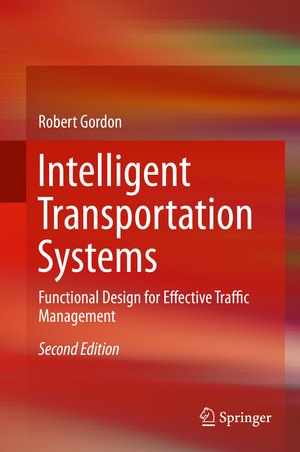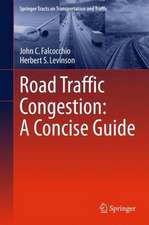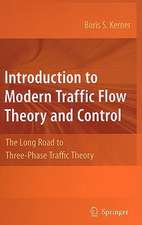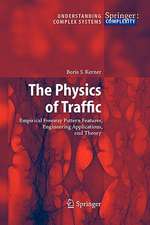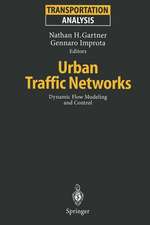Intelligent Transportation Systems: Functional Design for Effective Traffic Management
Autor Robert Gordonen Limba Engleză Hardback – 11 noi 2015
| Toate formatele și edițiile | Preț | Express |
|---|---|---|
| Paperback (1) | 584.26 lei 6-8 săpt. | |
| Springer International Publishing – 23 aug 2016 | 584.26 lei 6-8 săpt. | |
| Hardback (1) | 573.02 lei 38-44 zile | |
| Springer International Publishing – 11 noi 2015 | 573.02 lei 38-44 zile |
Preț: 573.02 lei
Preț vechi: 707.43 lei
-19% Nou
Puncte Express: 860
Preț estimativ în valută:
109.66€ • 114.07$ • 90.53£
109.66€ • 114.07$ • 90.53£
Carte tipărită la comandă
Livrare economică 10-16 aprilie
Preluare comenzi: 021 569.72.76
Specificații
ISBN-13: 9783319147673
ISBN-10: 3319147676
Pagini: 282
Ilustrații: XVIII, 282 p.
Dimensiuni: 155 x 235 x 19 mm
Greutate: 0.73 kg
Ediția:2nd ed. 2016
Editura: Springer International Publishing
Colecția Springer
Locul publicării:Cham, Switzerland
ISBN-10: 3319147676
Pagini: 282
Ilustrații: XVIII, 282 p.
Dimensiuni: 155 x 235 x 19 mm
Greutate: 0.73 kg
Ediția:2nd ed. 2016
Editura: Springer International Publishing
Colecția Springer
Locul publicării:Cham, Switzerland
Public țintă
Professional/practitionerCuprins
Introduction.- Cost Effective Design Processes.- Functional ITS Design Issues.- Non-Recurrent Congestion – Improvement of Time to Clear Incidents.- Non-Recurrent Congestion: Incident Information to Motorists.- Recurrent Congestion – Information to Motorists.- Ramp Metering.- Transportation Management Centers.- Evaluation of System Design and Operation.- Active Traffic Management (ATM).- Corridor Management.- Website Support.
Notă biografică
Robert L. Gordon, P.E., has over forty years' experience in the research, design, development and management of Intelligent Transportation Systems. He is the creator of software and tool sets that assist in ITS design, assessment and management, including ALMA for automated vehicles, PlanSked for signal scheduling and Design ITS for intelligent freeway design.
Textul de pe ultima copertă
· Provides Intelligent transportation system (ITS) planners and managers with practical tools and methodologies supporting economical and efficient design
· Includes new chapters on the most cutting-edge advances in Active Transportation and Demand Management (ATDM), transportation corridors, coordination of traffic management centers, and evaluation of ITS designs and operations
· Examples and cost-benefit analyses drawn from actual projects clearly illustrate concepts
· Features methodologies and algorithms for automated evaluation using traffic management center data
Intelligent Transportation Systems: Functional Design for Effective Traffic Management provides practical guidance on the efficient use of resources in ITS designs. The author explains how functional design alternatives can meet project objectives and requirements with optimal cost effectiveness, and clarifies how transportation planning and traffic diversion principles relate to functional ITS device selections and equipment locations. Methodologies for translating objectives to functional device types, determining device deployment densities, and determining the best placement of CCTV cameras and dynamic message signs are provided, as are models for evaluating the benefits of design alternatives based on traffic conditions. Concepts for planning various geographic levels of diversion are described. Readers will learn how to
reduce recurrent and non-recurrent congestion, improve incident clearance time, , provide real-time incident information to motorists, and use transportation management center data to implement lane use and speed controls that are key to new active transportation and demand management (ATDM) methods. The author describes the processes and algorithms for using transportation management center data to evaluate ITS performance, and offers examples of how states have organized evaluation results into performance reports for use by decision makers and the public. The book focuses on ITS treatments that improve safety and mobility, reduce motorist delays, improve the use of energy and reduce vehicle emissions. This resource will greatly benefit all ITS designers and managers, and is of pivotal importance for operating agencies performing evaluations to justify operational funding and system expansions.
· Includes new chapters on the most cutting-edge advances in Active Transportation and Demand Management (ATDM), transportation corridors, coordination of traffic management centers, and evaluation of ITS designs and operations
· Examples and cost-benefit analyses drawn from actual projects clearly illustrate concepts
· Features methodologies and algorithms for automated evaluation using traffic management center data
Intelligent Transportation Systems: Functional Design for Effective Traffic Management provides practical guidance on the efficient use of resources in ITS designs. The author explains how functional design alternatives can meet project objectives and requirements with optimal cost effectiveness, and clarifies how transportation planning and traffic diversion principles relate to functional ITS device selections and equipment locations. Methodologies for translating objectives to functional device types, determining device deployment densities, and determining the best placement of CCTV cameras and dynamic message signs are provided, as are models for evaluating the benefits of design alternatives based on traffic conditions. Concepts for planning various geographic levels of diversion are described. Readers will learn how to
reduce recurrent and non-recurrent congestion, improve incident clearance time, , provide real-time incident information to motorists, and use transportation management center data to implement lane use and speed controls that are key to new active transportation and demand management (ATDM) methods. The author describes the processes and algorithms for using transportation management center data to evaluate ITS performance, and offers examples of how states have organized evaluation results into performance reports for use by decision makers and the public. The book focuses on ITS treatments that improve safety and mobility, reduce motorist delays, improve the use of energy and reduce vehicle emissions. This resource will greatly benefit all ITS designers and managers, and is of pivotal importance for operating agencies performing evaluations to justify operational funding and system expansions.
Caracteristici
Provides Intelligent transportation system (ITS) planners and managers with practical tools and methodologies supporting economical and efficient design Includes new chapters on the most cutting-edge advances in Active Transportation and Demand Management (ATDM) and Connected Vehicles Examples and cost-benefit analyses drawn from actual active traffic management projects clearly illustrate concepts Features methodologies and algorithms for automated evaluation using traffic management center data Request lecturer material: sn.pub/lecturer-material
